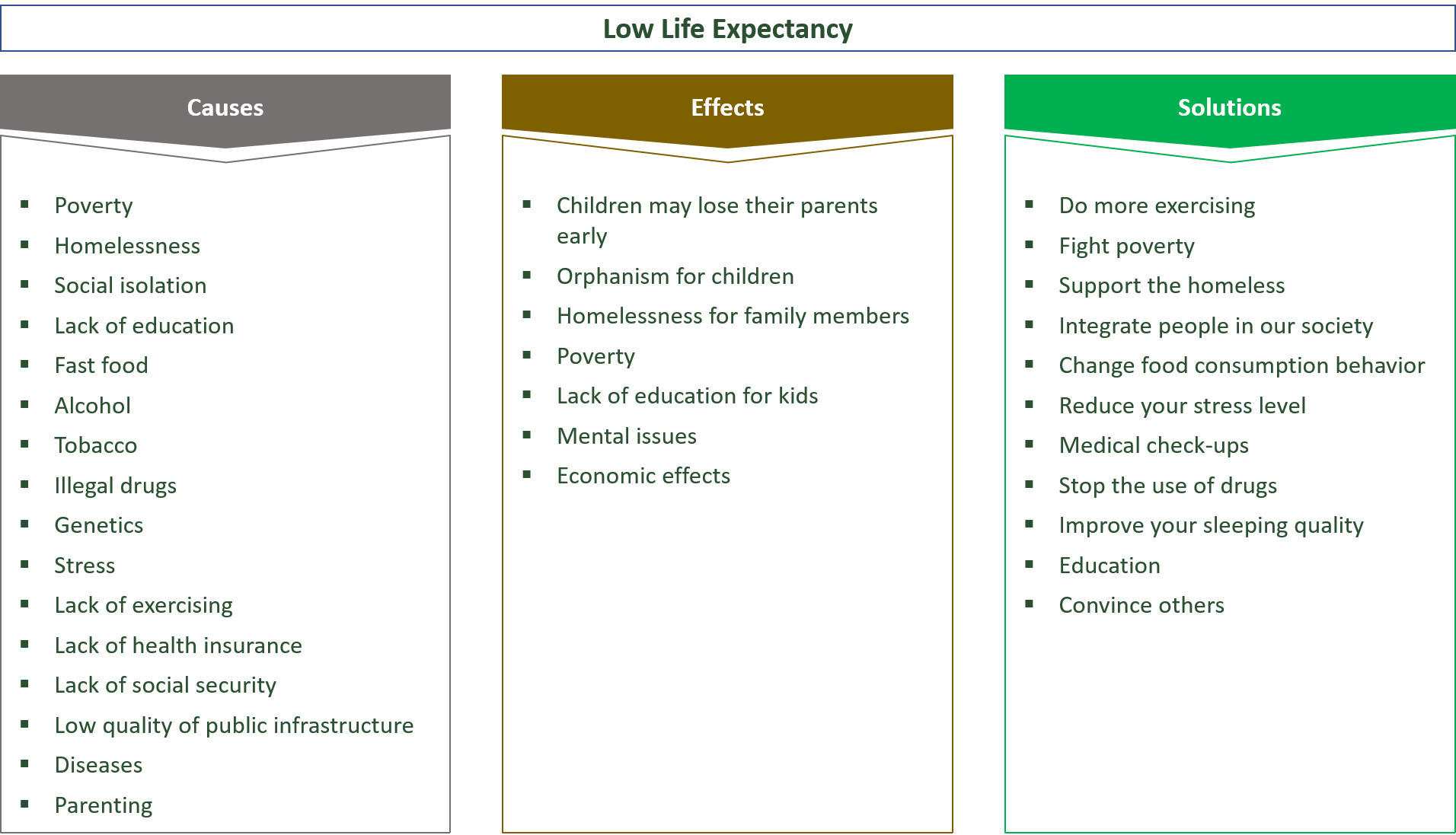“Life expectancy is a statistical phenomenon. You could still be hit by the proverbial bus tomorrow.”
Ray Kurzweil, Inventor
Low Life Expectancy: Causes, Effects & Solutions

A low life expectancy can be defined as a below-average age a person might reach on average when he or she is born for every respective date.
Especially in poor developing countries, life expectancy is quite low compared to rich industrialized countries.
But why is it that way?
In this article, the causes and effects regarding a low life expectancy as well as potential solutions for how to increase life expectancy are examined.
Audio Lesson
Contents
What is Global Life Expectancy?
Although life expectancy varies heavily across countries, the average worldwide life expectancy amounts to 72 years according to the WHO.
Women (around 74 years had a higher life expectancy than men (around 70 years).
The region with the lowest average life expectancy is the African region with a life expectancy of around 61 years.
The region with the highest life expectancy is the European region with a life expectancy of 77.5 years.
Causes for a Low Life Expectancy
- Poverty
- Homelessness
- Social isolation
- Lack of education
- Fast food
- Alcohol
- Tobacco
- Illegal drugs
- Genetics
- Stress
- Lack of exercising
- Lack of health insurance
- Lack of social security
- Low quality of public infrastructure
- Diseases
- Parenting
Poverty
Poverty is one big cause of a low life expectancy.
Poor people have many disadvantages when it comes to medical treatment, education and several other factors that would contribute to a higher life expectancy.
Therefore, people who are poor tend to have lower life expectancies compared to wealthy people.
Moreover, also the children of poor parents are more likely to have a low life expectancy since poverty can be inherited.
Homelessness
If you are homeless, your life expectancy decreases as well.
This is due to the fact that the food consumption behavior of homeless people is often quite unhealthy since they are not able to afford healthy food or drinks.
Moreover, if you have to sleep outside in winter, you may die due to the cold temperature which further decreases your life expectancy.
Additionally, you have also a greater risk to become a victim to violence if you live on the streets since you often are unprotected against attacks.
Social isolation
Many studies have shown that people who have many social connections have a higher average life expectancy than people who are socially isolated.
This may be due to the fact that if you have many social connections, you may stay more active and also may have the incentive to live longer since you enjoy your life more.
Thus, an absence of social connections might in turn lead to a lower life expectancy.
Lack of education
Life expectancy is also correlated with education.
If you have a high level of education, your life expectancy tends to be longer compared to people with low levels of education.
This may be due to the fact that people with a high level of education are better able to detect dangers and may be more reasonable in their behavior to avoid dangers than people with a low level of education.
Moreover, a better education also often leads to a healthier life, which indirectly also increases life expectancy.
Thus, a lack of education may also contribute to a low life expectancy.
Fast food
The consumption of excessive amounts of fast food may also lower life expectancy significantly.
Fast food is often quite unhealthy and increases the risk for diabetes or heart conditions.
It also contributes to becoming obese and the resulting adverse health effects.
Therefore, unhealthy food consumption can substantially increase the probability of serious health conditions and might therefore lower life expectancy.
Alcohol
Alcohol is another big issue when it comes to life expectancy.
Alcohol is often glamorized in our society.
However, it is one of the most dangerous drugs on our planet.
Alcohol can lead to cirrhosis of the liver and may also lead to several other physical health problems.
Moreover, alcohol can also increase the risk for mental diseases.
Therefore, especially for people consuming excessive amounts of alcohol on a regular basis, these people have a much lower life expectancy compared to people who refrain from drinking too much alcohol.
Tobacco
The use of tobacco is another significant contributor to a low life expectancy.
There are several health issues related to tobacco.
Some of them, like lung cancer, are quite deadly and significantly lower your life expectancy.
The excessive use of tobacco may also lead to additional health issues, like heart conditions or other serious conditions.
Illegal drugs
The use of illegal drugs may also lower your life expectancy.
Depending on the drug, it can cause severe physical health conditions.
Some drugs may also lead to an overdose, which in turn can translate into death for the respective person.
Moreover, the use of drugs also increases the likelihood to end up homeless, which further decreases life expectancy.
Genetics
Genetics also play a major role for individual life expectancy.
If you have parents who lived quite long, chances are that your genetics will allow you to live longer as well.
Although the connection between genetics and life expectancy is quite hard to prove since there are so many other factors that come into play, many researchers have concluded that genetics play an important role for individual life expectancy.
Stress
Another contributor to low life expectancy is stress.
Especially in our nowadays society, people are often overwhelmed by the level of information that is reaching them.
Moreover, also in their jobs, studies found that people feel stressed plenty of times.
Stress can drastically lower life expectancy since it leads to all kinds of health-related issues.
For instance, stress may lead to hearth conditions and strokes.
Moreover, it may also lead to mental issues, which in turn may lead to an increased probability for accidents or suicide.
Lack of exercising
Physical activity is important to keep our bodies healthy.
This does not necessarily mean that you have to go to the gym.
It could just mean to go for a walk every day.
Studies have shown that only 30 minutes of physical activity each day significantly improves your health.
Thus, in turn, a lack of exercise will lower your life expectancy since you are more likely to develop obesity or other diseases which in turn may lead to heart conditions and may eventually kill you.
Lack of health insurance
Life expectancy can also depend on the presence or absence of proper health insurance.
If you have no health insurance, the time may come when you suffer from a severe disease.
Chances are that you will not be able to afford the treatment costs without health insurance.
Thus, if you do not get proper medical treatment, your chances to die from those kinds of serious diseases increase dramatically.
Thus, a lack of health insurance can contribute to a low life expectancy.
Lack of social security
A lack of social security may also lower your chances for a long life.
If you have no social security, your risk of becoming homeless increases.
Moreover, also the chances that you will not be able to live a healthy lifestyle will increase.
Additionally, you may worry about your lack of social security, which may lead to mental issues.
All these factors will increase your overall life expectancy due to a lack of social security.
Low quality of public infrastructure
Depending on the country you are living in, there may be enormous differences in the quality of public infrastructure.
This includes the quality of public transportation, but also the quality of medical treatment.
If you live in a country with low medical standards, your life expectancy might also be low since in case of serious health conditions, you might not get proper treatment.
Diseases
If you live in regions where many serious diseases are prevalent, your life expectancy will also be lower since you have a higher chance to die from those health issues compared to people living in countries where there are less serious diseases around.
Parenting
Parents have a big influence on their children.
If you grew up in a household where your parents treated you with respect and showed you how to navigate through your life in a safe manner, your life expectancy will be higher than if you have parents who have drug issues and do not take care of you properly.
Therefore, the kind and quality of parenting play a major role when it comes to accessing the life expectancy of people.

Effects of a Low Life Expectancy
- Children may lose their parents early
- Orphanism for children
- Homelessness for family members
- Poverty
- Lack of education for kids
- Mental issues
- Economic effects
Children may lose their parents early
One effect of a low life expectancy is that children may lose their parents at a rather early age.
This may lead these children to develop mental issues since they might be overwhelmed by the situation may not be able to deal with their loss properly.
Orphanism for children
If both of their parents have a low life expectancy, there is a higher chance for children to suffer from orphanism.
This may lead to severe mental as well as physical issues for these children.
Orphans are more likely to end up homeless since they often do not have people who take care of them.
Moreover, they also are at greater risk of doing drugs which in turn decreases their life expectancy.
Homelessness for family members
In case only a few family members provide for a big family, if those family members have a low life expectancy, the remaining family may end up homeless since the remaining family members may not be able to provide enough income to afford to rent a home.
This may lead to several other issues related to homelessness and may also lead to a vicious circle which is hard to break once you are homeless since there are many frictions that prevent people to be able to go back into their old life.
Poverty
A low life expectancy of parents also increases the likelihood of poverty for family members, especially for children.
If your parents die when you are young, chances are that you will financially struggle, especially if you live in countries with a lack of social security.
This will lead to several additional issues related to poverty for those children and family members.
Lack of education for kids
A low life expectancy of parents may also increase the likelihood of a lack of education for their kids.
If your parents die young, you are usually at risk to become uneducated since no one is looking after your education.
This is especially true in countries where attending school is considered to be a luxury.
In those regions, chances will be almost zero that these children get a proper education without anyone supporting them.
Mental issues
Some people may also develop mental health issues due to a low life expectancy.
This could come from a loss of a family member that died young or also from the fear that the own life expectancy might be quite low and people may therefore worry too much, which may lead to mental health conditions.
Economic effects
Apart from all other effects, there are also economic effects from a low life expectancy.
However, studies have shown quite different results over time concerning the net effect of low life expectancy.
While a low life expectancy will lead to a loss of manpower, it will also benefit society since there are fewer old people who need financial support and expensive health treatments.
Thus, it is still unclear which effect dominates and studies often come to inconsistent results regarding this topic.

How can you increase Life Expectancy?
- Do more exercising
- Fight poverty
- Support the homeless
- Integrate people in our society
- Change food consumption behavior
- Reduce your stress level
- Medical check-ups
- Stop using drugs
- Improve your sleeping quality
- Education
- Convince others
Do more exercising
Exercising is crucial in order to stay healthy and to increase your life expectancy.
It does not necessarily mean that you have to go to the gym every day and work out quite hard.
It just means that you should have enough physical movement in your daily life.
A lack of physical exercise will vastly increase the probability of all kinds of health issues.
Therefore, it is crucial to frequently work out or go for a walk if you want to increase your life expectancy.
Fight poverty
Since poverty and its related effects are a big contributor to a low life expectancy, it is crucial to fight poverty.
This could be done using several different measures, including better education, higher minimum wages or additional measures to protect people and especially children to suffer from poverty.
Support the homeless
It is also crucial that we have programs for homeless persons in place in order to increase their life expectancy.
This includes a shelter, especially in winter since homeless people may die due to the cold temperatures.
Moreover, it also includes providing homeless people with healthy food to increase their chances for a longer life.
Additionally, many homeless people are also doing legal or illegal drugs.
Convincing them to refrain from using these drugs may further increase their life expectancy.
Integrate people in our society
In order to increase life expectancy, it is also crucial that we integrate people in our society as well as possible and that no one is left behind.
Loneliness can be a key driver for a short life since people may not feel valuable and will not have many social connections, which may lead them to lose their will to live pretty soon.
It has been shown by scientists that our mental state plays an important role when it comes to living a long life.
Change food consumption behavior
Our nutrition is crucial for a healthy life and therefore also for a high life expectancy.
Many people nowadays work quite long and often just grab fast food on their way home from work.
However, by doing so, people consume lots of unhealthy ingredients on a regular basis, which may eventually lead to severe health conditions.
Thus, it is necessary that people prioritize healthy food and that they take the time to cook by themselves rather than consume unhealthy fast food in order to increase life expectancy.
Reduce your stress level
Since a high stress level is a key driver for a decrease in life expectancy, it is crucial that you adjust your daily life behavior in a way that reduces your stress level.
This includes stress related to your work but also includes private stress related to your family and friends.
By avoiding stress whenever possible, you can live a healthier and probably also a longer life.
Medical check-ups
You should also make sure that you have medical check-ups on a regular basis.
Your blood values are crucial when it comes to the development of health issues.
Moreover, potential diseases can be detected early on and can be treated which increases the chance to cure those health issues.
Therefore, attending medical check-ups is highly recommended to increase your life expectancy.
Stop using drugs
Many of the drugs people consume in their daily life are quite bad for their health.
This includes illegal drugs, but also legal drugs like alcohol or also excessive amounts of caffeine.
Millions of people die each year from the use of alcohol and tobacco.
Even though most societies around the globe glorify alcohol, it is one of the most dangerous drugs you can consume.
The effects of drug use are often horrible since some drugs like alcohol may lead to long-term physical and psychic issues.
Moreover, some of the drugs imply a high risk of overdoses.
All these effects may drastically lower your life expectancy.
Improve your sleeping quality
Sleep is crucial and is directly linked to a healthy lifestyle.
Enough and also high-quality sleep will give you more power to work and be creative once you wake up.
During our sleep, our bodies also remove harmful substances out of our system.
Hence, sleep is crucial to stay healthy long-term.
Thus, sleep is also crucial when it comes to being able to increase your life expectancy since it is directly linked to your health.
Education
When it comes to a healthy lifestyle, education is key to convince people to sacrifice their consumption of fast food and other convenience stuff in order to stay vital.
Many people are just not fully aware of how their food consumption affects their health.
This is especially true if you grow up in a family where your parents do not care at all about the quality of food.
Since your parents have a big influence on their children, you may adopt this unhealthy food consumption behavior and may maintain it into your adult life.
Therefore, in order to avoid the adverse effects of unhealthy food consumption, it is crucial to start education quite early in school so that school kids can also convince their parents to provide more healthy food at home in order to increase the life expectancy of the whole family.
Convince others
You should also try to convince people about how they can increase their own life expectancy by changing their consumption behavior in their daily life.
By doing so, you can improve the overall life expectancy of our society, which may also increase your well-being since you made a good deed.
Conclusion
Our life expectancy depends on several different factors, most of which we can influence directly in our daily life.
This includes eating healthy and to do your exercising on a regular basis.
However, there are also people that do not have the power to help themselves.
This includes homeless people and also poor people who have no chance to escape their bad living conditions yet.
For these people, governments should provide suitable programs in order to ensure a better lifestyle for them and thus to increase their life expectancy.
By doing so, we can increase the overall life expectancy of our global population.
Sources
https://en.wikipedia.org/wiki/Life_expectancy
https://voxeu.org/article/disease-and-development-does-living-longer-raise-economic-growth
https://www.who.int/gho/mortality_burden_disease/life_tables/situation_trends_text/en/
https://www.economist.com/graphic-detail/2019/06/25/what-is-the-most-dangerous-drug

About the author
My name is Andreas and my mission is to educate people of all ages about our environmental problems and how everyone can make a contribution to mitigate these issues.
As I went to university and got my Master’s degree in Economics, I did plenty of research in the field of Development Economics.
After finishing university, I traveled around the world. From this time on, I wanted to make a contribution to ensure a livable future for the next generations in every part of our beautiful planet.
Wanna make a contribution to save our environment? Share it!